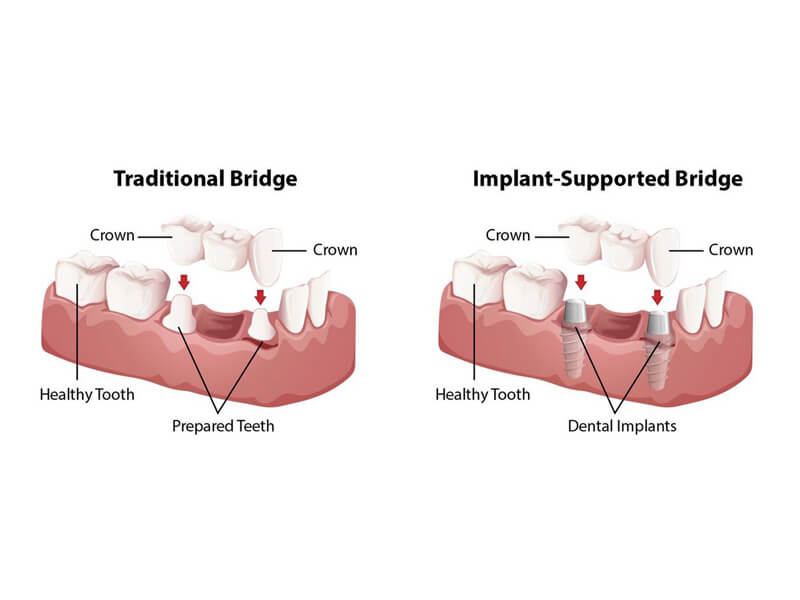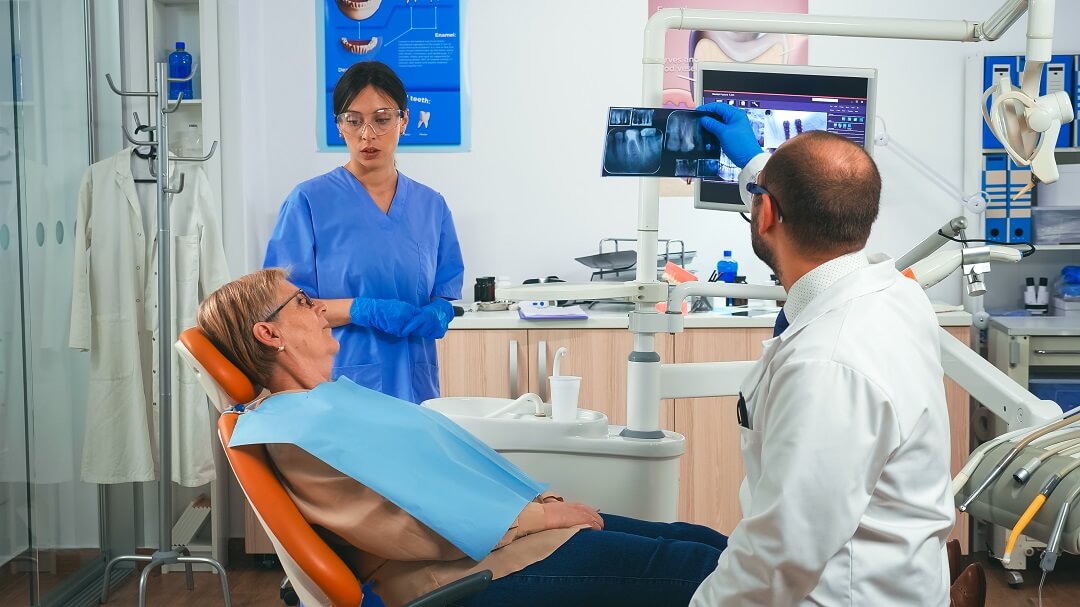Are you considering getting a dental bridge but worried about the pain? The thought of having your teeth drilled and shaped to fit a prosthetic can be daunting, to say the least.
But let’s get real. Fear of discomfort shouldn’t hold you back from restoring your smile and oral health. The truth is much less intimidating than what you may have imagined.
In fact, most patients report minimal discomfort during the procedure and agree that any minor inconvenience does not outweigh the benefits of getting a dental bridge.
Key Takeaways
- Getting a dental bridge doesn’t usually hurt, as local anesthesia is used during the procedure.
- Healing takes around 1-2 weeks. During recovery, practice good oral hygiene, eat soft foods, and avoid harmful habits.
- Contact your dentist immediately if you experience severe pain, persistent swelling, or unusual sensitivity around the dental bridge.
Reasons for getting a dental bridge
A dental bridge is an excellent choice for replacing missing teeth. It could be the right option if you’re looking to fill in those gaps.
1. Smile and facial aesthetics restoration
Losing one or more teeth can significantly impact your smile and overall facial aesthetics. But, with the help of a dental bridge, you can restore that natural look by filling in those gaps with artificial teeth designed to mimic your original ones closely.
2. Maintaining proper bite alignment
The absence of even one tooth may cause the remaining ones around it to shift out of place over time. This can potentially lead to bite misalignment issues such as temporomandibular joint disorder (TMJ). Installing a dental bridge prevents these movements effectively, thereby maintaining proper alignment within your mouth.
3. Eating functionality improvement
If there’s something we all enjoy doing daily without much thought – it’s eating. Losing any tooth makes chewing certain foods quite challenging, affecting our nutritional intake directly. With dental bridges, normal functionality during meals is restored because they efficiently replicate the biting force exerted by the natural healthy teeth.
4. Speech enhancement
You’d be surprised how significantly losing teeth affects speech clarity. This is due largely to certain phonetic sounds requiring tongue-to-teeth contact. After replacing missing teeth with bridges, speech clarity usually follows soon enough post-procedure completion.

Pain and discomfort during and after the procedure
Pain is not typically part of the equation when it comes to dental bridge procedures. Applying local anesthesia ensures that any potential for discomfort is effectively mitigated.
The journey begins with your dentist readying the abutment teeth – which will support your new bridge. This often involves reshaping these teeth by removing a portion of enamel to create space for a crown. Impressions are then taken as models to create an accurate replica in the dental lab.
Anesthesia may keep you comfortable during this process, but some patients might experience minor soreness or sensitivity once its effects wear off post-procedure. These symptoms usually subside within days, and over-the-counter medications like Ibuprofen should suffice to manage them.
Mild discomfort post procedure
In most cases, any initial discomfort following the placement of a dental bridge lasts only several days while your mouth acclimates around its new addition. You could also notice increased sensitivity when consuming hot or cold foods initially. However, this too should gradually diminish over time.
If persistent pain beyond normal (indicating possible infection) persists, don’t hesitate to reach out immediately for professional help. Remember, early intervention can prevent complications.
Caring for your mouth after the procedure
To ensure proper healing post-procedure, follow all instructions given by your dentist regarding oral hygiene practices, such as brushing twice daily using fluoride toothpaste along with regular flossing between teeth, including under artificial ones.
Avoid chewing hard food items directly onto newly fitted bridges until they’ve fully settled inside the mouth cavity.

Recovery time and aftercare
Recovery following a dental bridge procedure can be unique for each individual. Generally, healing typically occurs within one to two weeks.
Your dentist will give you specific guidelines on post-procedure care. Adhering strictly to these instructions plays a vital role in ensuring proper healing.
1. Maintaining oral hygiene
Prioritizing oral hygiene during your recovery phase cannot be overstated. Regular brushing and flossing into your daily routine helps ward off plaque accumulation around the new bridge.
In addition, frequent rinses with warm salt water are also effective against gum soreness or inflammation surrounding the area of operation.
2. Dietary considerations
As far as dietary considerations go, it’s generally recommended that patients stick with soft foods. Avoid applying direct pressure onto newly fitted bridges until they are fully settled.
3. Avoid harmful habits
To extend dental bridge’s lifespan, certain habits should ideally take a backseat, such as nail-biting, and teeth grinding. These activities can inflict damage on natural dentition and prosthetic devices. According to numerous studies, engaging in relaxation techniques when experiencing stress-induced clenching or grinding has proven beneficial.
When to seek professional help
If symptoms like severe pain persist, swelling doesn’t subside within a few days post-operation, or a loose feeling arises concerning dental bridges, don’t hesitate to contact professional help immediately.
Sensitivity in teeth adjacent to the dental bridge can also signal issues needing attention. If consuming hot or cold foods causes sharp pains, this might mean that the gums around your prosthetic device haven’t fully healed yet.
Bleeding from where your dentist installed the dental bridge should not continue. Persistent bleeding may suggest tissue damage or other underlying problems with gum health.

Frequently Asked Questions
How painful is getting a dental bridge?
The procedure for getting a dental bridge is typically painless. A local anesthesia is used to numb the area before work begins.
Why does a dental bridge hurt?
A new dental bridge may cause temporary discomfort or sensitivity as your mouth adjusts. Persistent pain could indicate issues that need professional attention.
How uncomfortable is a bridge?
Mild discomfort after receiving a dental bridge is normal and usually subsides within a few days. Over time, most people find their bridges comfortable and functional.
Is it normal to feel pain after a bridge?
Mild soreness post-procedure can be expected but should fade quickly. If you experience prolonged or severe pain, consult with your dentist immediately.
Embrace the bridge to a brighter smile!
Getting a dental bridge is generally painless, thanks to modern anesthesia techniques. The benefits of a dental bridge, such as restoring your smile, maintaining proper bite alignment, and improving speech and eating functionality, far outweigh any temporary inconvenience.
Remember to follow your dentist’s post-procedure care instructions, prioritize oral hygiene, and avoid harmful habits. With proper aftercare, you’ll be on your way to a comfortable and confident smile in no time.
Don’t hesitate to seek professional help if needed. Embrace the bridge to a brighter, healthier smile and enjoy the newfound confidence it brings!
Are you ready to restore your smile with confidence?
Contact us now and schedule an appointment.


